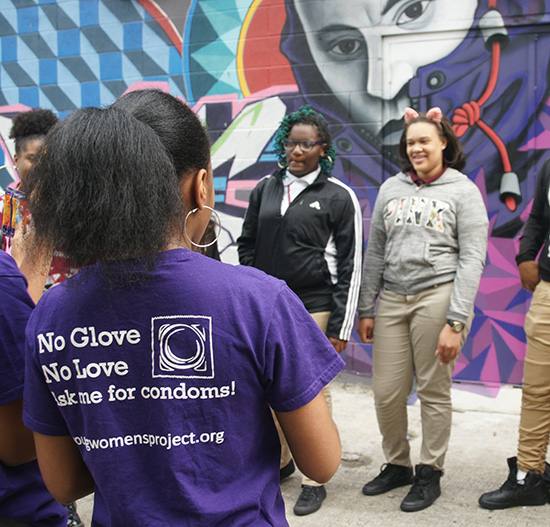Our Impact

YWP’s Youth Health Educator Program is a high impact, low cost intervention that has reduced city-wide pregnancy and STIs among teens and contributed significantly to DOH’s youth health agenda and numbers and the Mayor’s agenda of youth employment and engagement. Our dollar to impact ratio – at $1,285 per youth including wages -- exceeds and local or even national program of its kind. Since October, YWP employed 207 youth who distribute 76,697 condoms (male, female, and flavored), conducted 21,356 educational interventions, and made 927 individual clinic referrals. Youth staff trained 150 health teachers, collected data from more than 500 youth on health, violence, education, and other issues, cultivated more than 200 relationships with administrators and teachers in DC public and charter schools, presented more than 40 testimonies to Council Committees in health and education, and provided youth outreach for school-based STI-HIV testing.
Youth educators are reducing unplanned pregnancy and STI rates. YWP’s youth educators are making a significant school-level impact regarding condom use, sexual health decision making, and resource referrals. Since October, our educators:
- Distributed 64,247 male condoms, 3,346 female condoms, 9,104 flavored condoms, 5,430 lubricant packets, and 850 dental dams
- Made 927 Clinic Referrals
- Conducted 21,356 educational interventions
This work has had a significant impact on the school-based pregnancy and STI rates and clinic usage rates. Our teen pregnancy rate would look very different if it wasn’t for this work.
YHEP has a positive impact on the youth educators in the areas of education, work readiness, and own health:
YHEP has a positive impact on the youth educators in the areas of education, work readiness, and own health:
- 99% of our seniors were accepted to college or applied to college and waiting for results.
- 70% of our youth educators participate in college prep services
- None of our youth dropped out of school; none are truant
- 50% of all peer educators have above a 3.0 GPA and 80% have above a 2.0 GPA. 0% truancy rate among peer educators
- 80% of peer educators are involved in after school activities, and enrichment programs
- The birthrate among peer educators is zero.
This program provides jobs to youth. YHEP employs 250 youth and will employ 300 next year. Youth employment is not a goal of DOH – but it is a significant benefit of this program. Youth educators work 4-6 hours a week and receive a stipend of $8.25 an hour. The wages are modest – about $198 a month – but it’s enough to help out with family bills, pay their phone bills and even buy a week of groceries for their families. For families who rely on public assistance, this income is all the more significant. More importantly, youth are preparing for jobs. They keep track of time, collect data, and meet monthly distribution and education goals. Educators receive more than 50 hours of training in reproductive health, peer education and training, work readiness, project development, data collection, counseling, facilitation, educational strengthening, self-advocacy, and other issues. This year, we received more than 500 youth applications for 250 positions (189 in fall 2015 and 311 in spring 2016).
Youth educators made other significant contributions to health access and education. Youth educators trained 150 health teachers, collected data from more than 500 youth on health, violence, education, and other issues, cultivated more than 200 relationships with administrators and teachers in DC public and charter schools, presented more than 40 testimonies to Council Committees in health and education, and provided youth outreach for school-based STI-HIV testing. Youth educators also made significant contributions to the DC Health Education Standards which are scheduled for vote by the State Board of Education (SBOE) on April 20th, 2016 and if passed, will be implemented in the 2016-17 school year. Youth staff held peer focus groups and interviews, organized feedback sessions, and worked closely with School Board President Jack Jacobson and leaders from DCPS, OSSE, and several nonprofit organizations. These new standards, which are the most comprehensive, progressive and needs focused in the country, will establish a strong foundation for expanding and improving health education in all grades and all public schools. This work was not included in our DOH contract but it benefitted directly from the expertise and knowledge of peer educators.
Youth educators made other significant contributions to health access and education. Youth educators trained 150 health teachers, collected data from more than 500 youth on health, violence, education, and other issues, cultivated more than 200 relationships with administrators and teachers in DC public and charter schools, presented more than 40 testimonies to Council Committees in health and education, and provided youth outreach for school-based STI-HIV testing. Youth educators also made significant contributions to the DC Health Education Standards which are scheduled for vote by the State Board of Education (SBOE) on April 20th, 2016 and if passed, will be implemented in the 2016-17 school year. Youth staff held peer focus groups and interviews, organized feedback sessions, and worked closely with School Board President Jack Jacobson and leaders from DCPS, OSSE, and several nonprofit organizations. These new standards, which are the most comprehensive, progressive and needs focused in the country, will establish a strong foundation for expanding and improving health education in all grades and all public schools. This work was not included in our DOH contract but it benefitted directly from the expertise and knowledge of peer educators.


